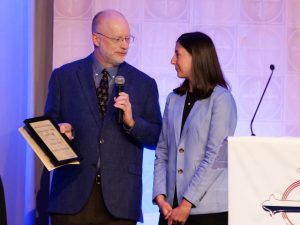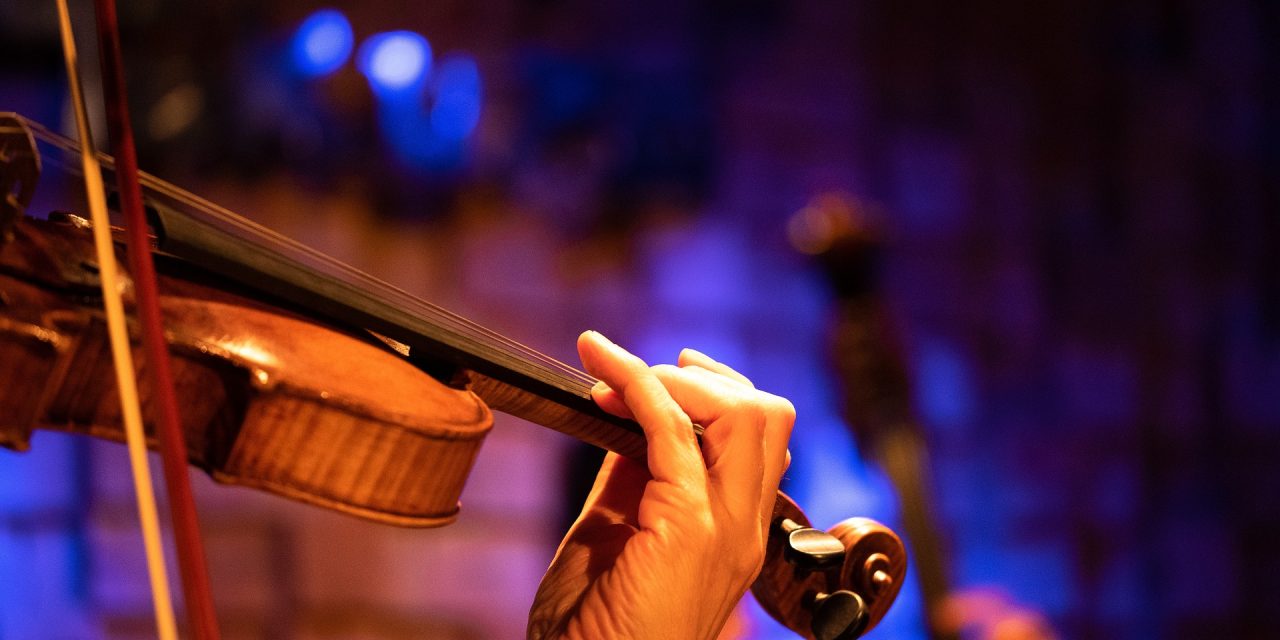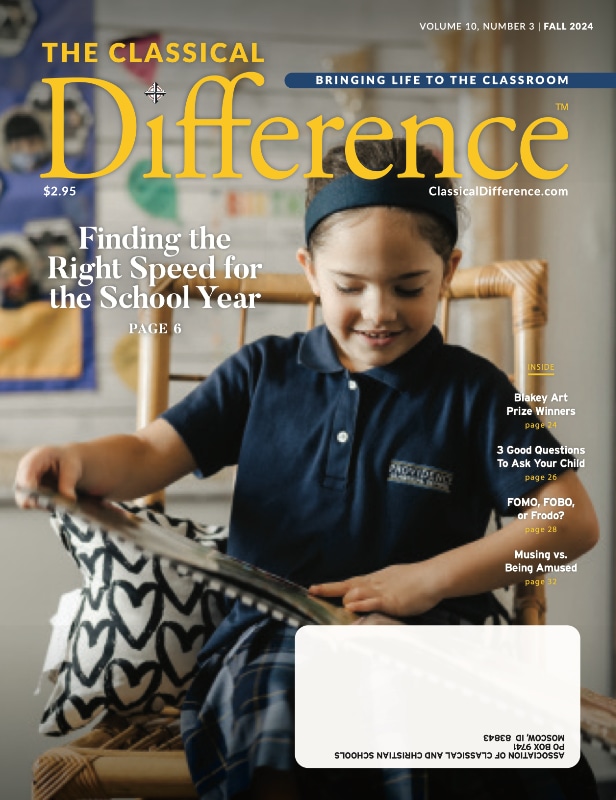BY JILLIAN BARR
WINNER OF THE 2023 CHRYSOSTOM ORATORY COMPETITION
What We’re Missing in Modern Music
From my grandpa playing Johnny Cash on his old guitar, to my mom singing U2 in the kitchen, to Seeds Family Worship on the radio, and to the classical music tracks that were a part of our homeschool curriculum, music has always been a prominent part of my life.
During my junior year of high school, however, I discovered a new depth of music when I endeavored to learn Beethoven’s Piano Sonata, “The Tempest.”
What about this piece captivated me? The roaring triplets? Its quick dynamic changes? Or the two-note phrases?
No, it was not any specific part of the piece that intrigued me. What struck me was that as a whole, the piece demonstrated a beauty almost incomprehensible, even inexplicable. Through Beethoven, I discovered something unique and profound, not only in this one piece, but in classical music itself.
As I continue to listen to and study classical music, my appreciation and wonderment for this music’s profound and beautiful nature only intensifies. I recently discovered that relatively few people share this appreciation I have found. In fact, less than five percent of the music streamed today is classical. This means that only a small fraction of the vast number of people who listen to music every day experience the beauty and wonder of pieces like Beethoven’s “The Tempest.” And sadly, the music they do listen to cannot compare to classical music in regard to beauty. But how did we get here?
Let me explain.
 Before the 20th century, 1600–1900 specifically, music was composed with acoustic instruments alone and focused on form. Composing music required exceptional thought and creativity, and those who composed music did so because they desired to create something beautiful. Composers also understood music’s depth. For example, Beethoven wrote that “music is the mediator between the spiritual and the sensual life … it is the one incorporeal entrance into the higher world of knowledge which comprehends mankind but which mankind cannot comprehend.” In other words, music held a unique value during this time because composers wrote objectively beautiful music, music that is whole, harmonious, and radiant (the three necessary elements according to Thomas Aquinas’ definition of beauty).
Before the 20th century, 1600–1900 specifically, music was composed with acoustic instruments alone and focused on form. Composing music required exceptional thought and creativity, and those who composed music did so because they desired to create something beautiful. Composers also understood music’s depth. For example, Beethoven wrote that “music is the mediator between the spiritual and the sensual life … it is the one incorporeal entrance into the higher world of knowledge which comprehends mankind but which mankind cannot comprehend.” In other words, music held a unique value during this time because composers wrote objectively beautiful music, music that is whole, harmonious, and radiant (the three necessary elements according to Thomas Aquinas’ definition of beauty).
With the advent of digital sound and mixing in the 20th century, music became much easier to compose. So easy in fact that almost anyone could write it. The amount of music that society produced each day increased dramatically, and people began consuming music as a commodity. A recent study shows that 1,000 new songs are uploaded to Spotify, Apple, and Google Music every hour. Instead of focusing on complex composition, modern music focuses on rhythm, rhyme, and melody to appeal to the populous. Today, industry propels modern music production and people define beauty by what sells, a subjective standard rooted in the ideas of enlightenment philosopher David Hume.
Because of this, people listen to music by Beyoncé, Taylor Swift, and The Weeknd, all modern artists whose music sells not because it demonstrates an objective beauty and wonder, but because it appeals to what our modern self finds pleasurable (though this leads into a whole other conversation on postmodernism). We consume this modern music only because it pleases and entertains us. But as we consume this music, we move further and further away from God’s highest purpose for music.
But, what is the highest purpose for music? The Reformed Church in America explains it well: “Music is made first of all to the Lord and only secondarily to each other. Music should communicate and express a sense of awe and wonder in the presence of God; it should lead our thoughts toward God rather than toward ourselves.” In other words, music should be an expression of worship to our God. I’d like to consider two reasons why classical music points to God and His beauty, prompting the listener to worship Him.
Classical music possesses a transcendent quality. God created all beauty. Because of this, all beauty reflects God. When music is created beautifully, it is transcendent—it reflects God. The classical composers intentionally composed their music skillfully and exquisitely to reflect the Divine. Because the beauty in classical music reaches beyond the material world to God, classical music is transcendent.
Classical music reflects God’s form, beauty, and complexity in Genesis. When God created the world, He brought order from chaos and demonstrated beauty by bringing the elements of creation together in a specific way. He spoke and the formless took form, and He called it good. Here, God established that form is an essential aspect of beauty. The classical composers used rhythm, notes, meter, dynamics, and technique to create beautiful music through form. Most musical creations are marked by their complexity, and God’s creation reflects the most intricate complexities known to mankind. Classical music’s emphasis on form reflects God because it reflects the complex form and beauty that He established in Genesis.
 Now, let me say that classical music has not lost its popularity because it lacks beauty or relevance; rather, people reject classical music because learning to enjoy it requires effort and discipline. It requires a trained ear, which listeners can only acquire through time and exposure. Today, we often value music only for its ability to entertain us, not to transform us by bringing a fuller understanding of God.
Now, let me say that classical music has not lost its popularity because it lacks beauty or relevance; rather, people reject classical music because learning to enjoy it requires effort and discipline. It requires a trained ear, which listeners can only acquire through time and exposure. Today, we often value music only for its ability to entertain us, not to transform us by bringing a fuller understanding of God.
Classical music represents art at the highest level of human achievement, reflecting the supreme beauty of the almighty God as no other genre of music does. This music is an ineffable gift, a gift we should not ignore. So parents, I ask you to immerse your children and students in classical music because these works of art will only benefit and transform the next generation if we listen to them. Show your children that music is more than a catchy tune and source of entertainment by turning on that classical music track and giving them a taste of the sublime. ✤
 JILLIAN BARR won the 2023 Chrysostom Oratory Competition. A 2023 graduate of Wilson Hill Academy, she plans to study piano at Southern Oregon University and teach 2nd grade at Mountain Scholars School.
JILLIAN BARR won the 2023 Chrysostom Oratory Competition. A 2023 graduate of Wilson Hill Academy, she plans to study piano at Southern Oregon University and teach 2nd grade at Mountain Scholars School.














Besides searching ‘classical music’ is there any good resources to share with children on Classical Music?
The best resource to share with children and students on Classical Music is the music itself. If you’re looking for a good list of pieces to start out with, I would recommend all of the Memoria Press enrichment lists. These can be found on both their website and on Spotify. If you’re looking for something to read to children and students about Classical Music, I would recommend a good biography on some of the well known composers. Biographies are helpful because they explain both the historical aspect of Classical Music (especially depending on the dates the composer wrote), with the… Read more »